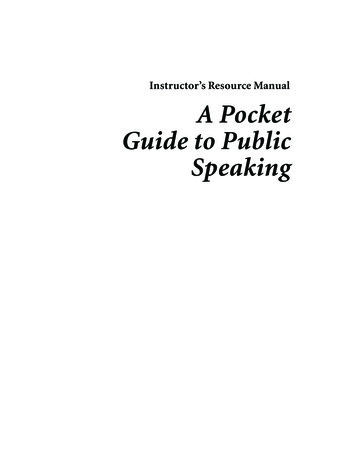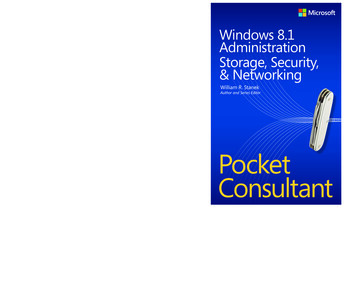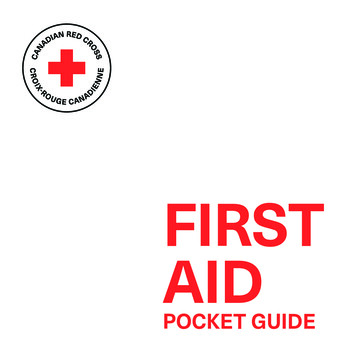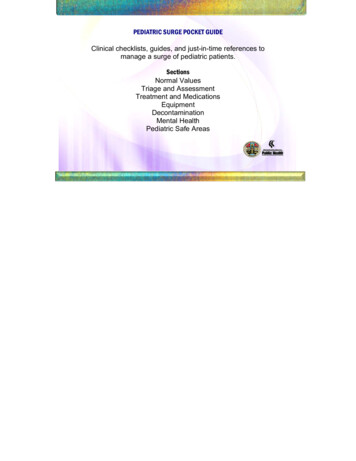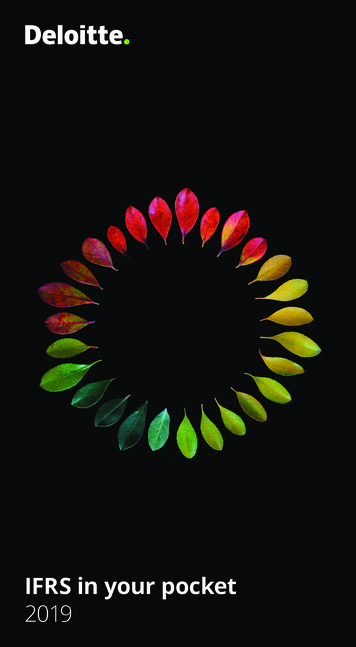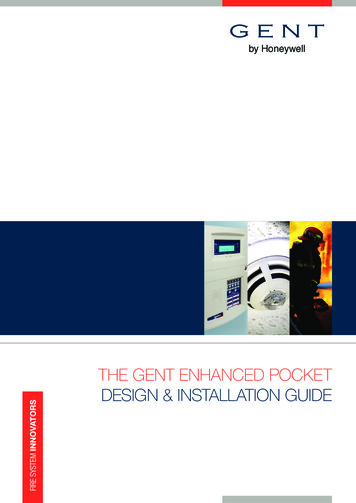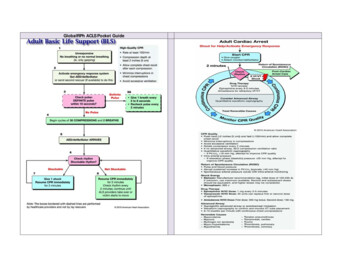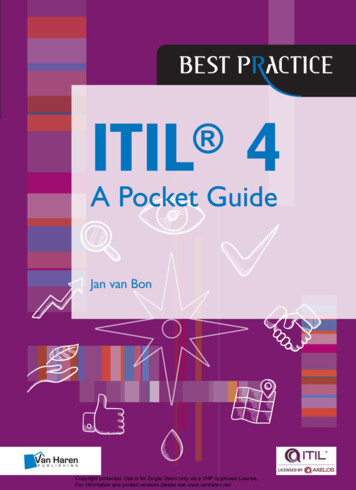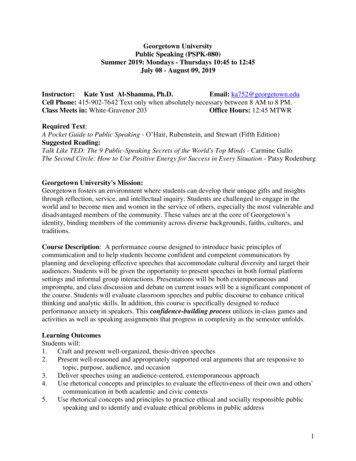
Transcription
Georgetown UniversityPublic Speaking (PSPK-080)Summer 2019: Mondays - Thursdays 10:45 to 12:45July 08 - August 09, 2019Instructor: Kate Yust Al-Shamma, Ph.D.Email: ka752@georgetown.eduCell Phone: 415-902-7642 Text only when absolutely necessary between 8 AM to 8 PM.Class Meets in: White-Gravenor 203Office Hours: 12:45 MTWRRequired Text:A Pocket Guide to Public Speaking - O’Hair, Rubenstein, and Stewart (Fifth Edition)Suggested Reading:Talk Like TED: The 9 Public-Speaking Secrets of the World's Top Minds - Carmine GalloThe Second Circle: How to Use Positive Energy for Success in Every Situation - Patsy RodenburgGeorgetown University's Mission:Georgetown fosters an environment where students can develop their unique gifts and insightsthrough reflection, service, and intellectual inquiry. Students are challenged to engage in theworld and to become men and women in the service of others, especially the most vulnerable anddisadvantaged members of the community. These values are at the core of Georgetown’sidentity, binding members of the community across diverse backgrounds, faiths, cultures, andtraditions.Course Description: A performance course designed to introduce basic principles ofcommunication and to help students become confident and competent communicators byplanning and developing effective speeches that accommodate cultural diversity and target theiraudiences. Students will be given the opportunity to present speeches in both formal platformsettings and informal group interactions. Presentations will be both extemporaneous andimpromptu, and class discussion and debate on current issues will be a significant component ofthe course. Students will evaluate classroom speeches and public discourse to enhance criticalthinking and analytic skills. In addition, this course is specifically designed to reduceperformance anxiety in speakers. This confidence-building process utilizes in-class games andactivities as well as speaking assignments that progress in complexity as the semester unfolds.Learning OutcomesStudents will:1.Craft and present well-organized, thesis-driven speeches2.Present well-reasoned and appropriately supported oral arguments that are responsive totopic, purpose, audience, and occasion3.Deliver speeches using an audience-centered, extemporaneous approach4.Use rhetorical concepts and principles to evaluate the effectiveness of their own and others'communication in both academic and civic contexts5.Use rhetorical concepts and principles to practice ethical and socially responsible publicspeaking and to identify and evaluate ethical problems in public address1
Professor Al-Shamma’s Course Overview:There are two major through lines in this class. First, it is my goal to create a positive,emotionally supportive atmosphere where you can gain experience speaking to an audience andwhere you can experiment with various ideas and techniques associated with public speaking.Second, we will discuss the role of advocacy in a democratic society and explore the elements ofreasoning necessary for both creating and analyzing arguments.Grading BreakdownCode of Ethics/Value Hierarchy: 500-word paper, single-spaced15Extemporaneous Speech to Explain – 7 to 8 Minutes, 2 outlines15Memorized Oral Interpretation Performance – 4 Minutes15Extemporaneous Advocacy Speech – 7 to 8 Minutes, 2 outlines20Written Exam on Argumentation15Impromptu Speaking – 3 minutes10Your Choice Special Occasion Speech – 4 Minutes15Class Participation (in-class discussions/workshops)15Total possible points:120Extra Credit: Up to 10 points for “Moments of Mirth” -- Make jokes early and often EVALUATION OF STUDENT PERFORMANCE:All Written Work must be computer printed in black ink on white paper. Use a 12 pt. TimesNew Roman font. Use 1-inch margins. Staple multiple pages together before you arrive inclass.Outlines will be evaluated using a checklist. The point system will clearly delineate excellent,good, adequate, poor or failing effort examining the following:*Complete Full-Sentence Speech Outlines include: accurate specific purpose and central idea,strong thesis statement, well organized main points and supporting evidence, and a completeMLA bibliography.Speeches will be evaluated using a checklist. The point system will clearly delineate excellent,good, adequate, poor or failing effort looking for the following:*Extemporaneous delivery Not "reading" but delivered with presence in conversational mode*An Introduction that gains the attention of the audience; introduces the topic clearly; relates thetopic to the audience; establishes your credibility; and previews the body of the speech.*A Body of speech that demonstrates depth and quality in research, clarity of main points,organization of main points, suitable and specific evidential support for those main points, andthat reveals your sources.*A Conclusion that ends the speech in a creative way while reinforcing the central idea.*Delivery that employs quality eye contact, avoids distracting mannerisms, and demonstratesgood use of articulation, pauses, vocal variety, volume, rate of speech, and overall enthusiasmfor the speech.*Use of Language that is accurate, appropriate, and clearly understood.2
Final Grade calculation will be done on the following basis:93-100% A88-90% B 78-80% C 60-69% D90-92% A83-87% B73-77% C80-82% B70-72% C-Below 60% FTechnology PolicyThere will be no use of cell phones or laptop computers during class. Please turn them offand put them away. Points will be deducted from your grade for using either of these whileanother student is speaking or for leaving the classroom to make phone calls during class.AttendanceYour presence in this class is extremely important for several reasons, the top two of which I willmention here. First, this is a performance class; most of what you learn is embodied knowledge.It cannot be obtained from a book; you must experience it. Second, your classmates are relyingon you to serve as an audience member for their performances. They need and desire yourattention, which is an outward sign of your openness, goodwill, and support.*The attendance policy: Your final grade will be lowered by 3% for each absence.Please contact me by email as soon as possible regarding absences.Arriving to class late or leaving early will affect your grade: after 2 late arrivals or earlydepartures, your final grade will be lowered by 2% for each additional instance.Absences will affect your final grade. Students who miss more than two weeks worth ofscheduled classes may be requested to withdraw from the course; if they do not do so, they maybe given a failing grade.Religious HolidaysFrom Georgetown’s Academic Standards page: “Georgetown University promotes respect for allreligions. Any student who is unable to attend classes or to participate in any examination,presentation, or assignment on a given day because of the observance of a major religiousholiday (see below) or related travel shall be excused and provided with the opportunity to makeup, without unreasonable burden, any work that has been missed for this reason and shall not inany other way be penalized for the absence or rescheduled work. Students will remainresponsible for all assigned work. Students should notify professors in writing at thebeginning of the semester of religious observances that conflict with their classes. TheOffice of the Provost, in consultation with Campus Ministry and the Registrar, will publish,before classes begin for a given term, a list of major religious holidays likely to affectGeorgetown students. You can find the list of religious holidays on the Campus Ministry page.GU Honor Code: Georgetown’s honor system governing students prohibits dishonest conductand conduct lacking integrity of a variety of kinds, including (but not limited to) cheating onexams, plagiarism, using false citations, submitting work for multiple purposes, submitting falsedata, falsifying academic documentation, abuse of library privileges, and abuse of sharedelectronic media. All students are expected to adhere to the following pledge:“In pursuit of the high ideals and rigorous standards of academic life I commit myself to respectand to uphold the Georgetown University honor system: To be honest in every academicendeavor, and to conduct myself honorably, as a responsible member of the Georgetowncommunity as we live and work together.”3
For more information, visit the Georgetown Honor System pageThe penalties for violation of the policy may include a failing grade on the assignment, a failinggrade in the course, and/or a referral to the Dean and the Committee on Student AcademicHonesty.Accommodations for Students with Disabilities:Students with documented disabilities have the right to specific accommodations that do notfundamentally alter the nature of the course. Please alert me should you requireaccommodations. You will also need to contact the Academic Resource Center(http://academicsupport.georgetown.edu) located in Leavey Center.SPEECH ASSIGNMENTSSpeech To Explain (7-8 minutes)Delivery: ExtemporaneousFocus on: Organizing ideas; parallel outlining format; developing introduction, body, conclusion,transitions, and internal summaries; using concrete and colorful language; and use of sources.Required: Hand in TWO OUTLINES: full-sentence outline and the delivery outline1) Full Sentence outline with a BIBLIOGRAPHY showing at least 3 Credible Sources. Use theOUTLINE FORM attached to this syllabus and found in your textbook.2) Delivery outline an abbreviated version of your full sentence outline in exactly the sameoutline form, also called a Key Word Outline.Practice delivering your speech from this delivery outline. You must use a visual aid.Oral Interpretation of Literature Performance (4 minutes)Delivery: Memorized ScriptFocus on: Eloquent introduction and transitions, vocal variety, skillful use of pauses, emotionalexpressiveness, and revealing yourself to an audience.Required: A typed script with introduction, transitions, and at least 2 selections of literature from2 different genres. This script is to be secured in a lightweight binder that can be easily held inone hand during your performance. This presentation is developed around a central theme.Advocacy Speech (7-8 minutes)Delivery: ExtemporaneousFocus on: Organizing ideas (all skills listed for Speech to Explain) plus advocating a position.Required: A typed full-sentence outline with bibliography showing a minimum of 5 differenthighly credible sources.Required: A typed delivery outline and a visual aid.*For your speech to be graded, hand in BOTH the full-sentence outline and the delivery outline. Special Occasion Speech: Your choice of Inspiration, Celebration, After-Dinner, Eulogy, etc.We will discuss the options for this speech in class.4
Course CalendarWeek OneJulyMon-8Narrative Speeches; Extemporaneous Speaking: Topic selection,Thesis development, Parallel Outlining;Paper Assignment - Your Code of Ethics/Value HierarchyTues-9Embodied Listening; Use of Evidence; Thesis Statement is due today in class.Wed-10Positive Presence, Perception, Provisional Language, Polarization, Metaphors,Feedback FormThur-11Code of Ethics Paper Due Today in ClassWorkshop your speech introductions in class todayWeek TwoMon-15Tues-16Wed-17Thur-18Extemporaneous Speech to Explain PresentationsIntroduction to Oral Interpretation of TextWorkshop your OI PresentationsArgumentation TheoryWeek ThreeMon-22Argumentation Theory continuedTues-23Oral Interpretation of Text PerformancesWed-24Workshop Advocacy SpeechesThur-15Introduction to Special Occasion SpeakingWeek FourMon-29Tues-30Wed-31AugustThur-1Week FiveMon-5Tues-6Wed-7Thur-8Extemporaneous Advocacy SpeechesExtemporaneous Advocacy SpeechesWritten Exam on ArgumentationIntroduction to Impromptu SpeakingImpromptu Speaking -- ALL speeches in class todayWorkshop Special Occasion SpeechesWorkshop Special Occasion SpeechesSpecial Occasion Speeches5
Template for SPEECH PREPARATION OUTLINE (Full sentence content outline)Specific Purpose: WHAT am I talking about? Central Idea: WHY am I talking about it?Introduction (Create an outline that is specific to your speech; these steps may overlap.)I.Attention stepII.Reveal topicIII.Relate topic to audienceIV.Establish your credibility -- why are you qualified to talk about this?V.State your thesis:And preview the main points you will cover in the body of speech:A.B.C. etc.Transition to body:BodyI. Main point: (Subdivision of your thesis/restatement of Preview point A)A. Supporting information: (Subdivision of main point I)1. Specific information: (example/evidence and name the source)2. Specific information: (example/evidence and name the source)3. Specific information: (example/evidence and name the source)B. Supporting information: (Subdivision of main point I)1. Specific information: (example/evidence and name the source)2. Specific information: (example/evidence and name the source)Transition to 2nd main point:II. Main point: (Subdivision of your thesis/restatement of Preview point B)A. Supporting information: (Subdivision of main point II – name any sources)B. Supporting information: (Subdivision of main point II – name any sources)C. Supporting information: (Subdivision of main point II – name any sources)Possible internal summary and transition to 3rd main point:III. Main point: (Subdivision of your thesis/restatement of Preview point C)Transition to conclusion:ConclusionI. Review main points (Summarize in a fresh way – not just repetition)A.B.C.II. Review thesisII. Sense of completeness/Clincher – Present a vivid endingLIST HERE THE WRITTEN SOURCES OF INFORMATION FOR YOUR SPEECH:Bibliography1. Hackworth, David H. "Terms of Forgiveness." Newsweek. 24 Apr. 1995: 38-40.2. Potok, Chaim. The Chosen. New York: Fawcett Crest,1967.3. Hunt, Albert R. "Clinton Needs Fewer Reinventions and More Consistency." The Wall StreetJournal. 10 Jl.1995: A11-12.6
A Pocket Guide to Public Speaking - O’Hair, Rubenstein, and Stewart (Fifth Edition) Suggested Reading: Talk Like TED: The 9 Public-Speaking Secrets of the World's Top Minds - Carmine Gallo The Second Circle: How
